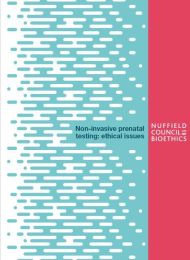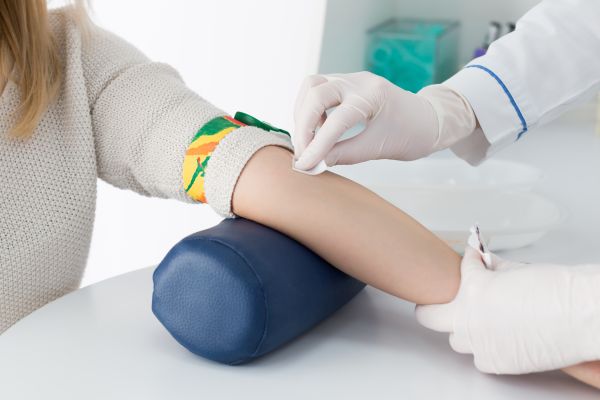Non-invasive prenatal testing: ethical issues
Report
Published 01/03/2017

NIPT in the private sector
In the UK, women and couples have been able to access NIPT for Down’s, Edwards’ and Patau’s syndromes in the private healthcare sector since 2012. Some NIPT manufacturers offer to test for other conditions, such as those caused by an unusual number of sex chromosomes (sex aneuploidy) or where tiny pieces of chromosome are missing (microdeletions), that are not currently offered in the NHS. Most offer NIPT to determine the sex of the fetus.
The majority of NIPT providers only offer their tests to women through hospitals and healthcare clinics, although some clinics are located in retail chains on high-streets. NIPT is also available on a direct-to-consumer basis from a small number of websites.
Regulation and professional standards
There is no law or regulation that covers all aspects of NIPT in the private sector, but various legal instruments and guidelines cover different elements of how NIPT is made, sold and provided.
The manufacture of NIPT tests in the UK are currently regulated under the UK Medical Devices Regulations 2002, which implements an EU Directive. This only applies where the test itself is carried out within the EU. Many tests currently being offered to women and couples in the UK involve sending their blood samples away to be analysed in the US or China and are not therefore covered by the Directive.
Private hospitals and clinics in which NIPT is offered are regulated by the Care Quality Commission (CQC) in England and by equivalent bodies in Scotland, Wales and Northern Ireland, and must carry out their services to certain standards.
Healthcare professionals that offer and provide NIPT services in the private sector must adhere to standards set by professional regulators such as the General Medical Council (GMC) or the Nursing and Midwifery Council (NMC). There is no specific professional guidance on using NIPT to test for genetic conditions or variations.
Advertising of products and services including NIPT is monitored by the Committee of Advertising Practice (CAP). CAP produces codes of conduct for advertising in broadcast and non-broadcast media. The codes are enforced by the Advertising Standards Authority.
Implications
Many issues raised by the offer of NIPT in the private sector are similar to those in the NHS, such as the possibility of failed or inconclusive tests and of unanticipated or secondary findings about the pregnant woman. However, we heard a number of concerns from people we spoke to during our project specifically relating to the way NIPT is offered:
Marketing and information
Although there are examples of good practice, there is commonly a lack of good quality information from manufacturers, private hospitals and clinics about the limitations of NIPT and the conditions being tested for. The information currently provided to women and couples is frequently incomplete, unsubstantiated, inaccurate or misleading, and some use emotive language. We also heard concerns that the follow-up support offered to women with a high chance result is inadequate, with the NHS being left to ‘pick up the pieces’. These concerns are particularly relevant to the provision of NIPT on a direct-to-consumer basis, in which the test might be offered and results delivered without the provision of adequate information or support.
NIPT for other conditions
The accuracy of NIPT for conditions such as microdeletions and sex aneuploidy has not been widely researched and the chance of a false positive result is often much higher than for Down’s, Edwards’ and Patau’s syndromes, which could lead to more women seeking invasive tests to confirm a diagnosis.
NIPT for sex determination
The offer of NIPT to reveal the sex of the fetus at an early stage in pregnancy may increase the risk of sex selective abortions taking place. This practice is opposed by many, believing it is sexist and wrong. There is some evidence that sex selective abortions have happened in the UK and they are known to occur in other countries. It is also known that people who live in countries where prenatal sex determination is illegal, such as China and India, travel to countries where it is legal to have tests
Possible future developments
It is possible that in future NIPT will be available in the private sector for a wider range of genetic conditions and features, and that these may include less significant medical conditions or impairments, or non-medical traits. Whole genome sequencing may also be offered, raising the possibility that large amounts of information about the genetic make-up of the fetus could be made available to prospective parents and stored for the future.
Key issues to consider regarding these possibilities include:
- whether the information being sought is medically useful;
- how best to respect the autonomy and protect the interests of the future child or adult, particularly the risk that such tests might undermine the future person’s ability to make their own choices about accessing and allowing others access to information that relates to their health, abilities, personality or physical attributes.
- whether allowing such tests would encourage discrimination against people with certain genetic features, including sex, or create damaging perceptions of what constitutes a ‘normal’ or ‘healthy’ baby.
For more information, see Chapter 4 of the full report.

Share